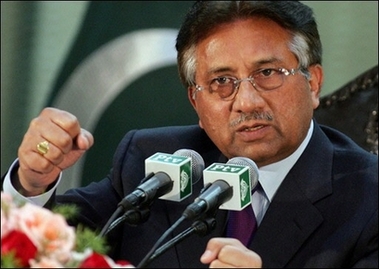Musharraf hails Kashmir talks with India
(AFP)Updated: 2007-02-05 21:29
ISLAMABAD - Pakistan President Pervez Musharraf said he was optimistic that a more conciliatory tone in talks with India would bring an end to their 60-year dispute over the Himalayan territory of Kashmir.
 Pakistan President Pervez Musharraf said he was optimistic that a more conciliatory tone in talks with India would bring an end to their 60-year dispute over the Himalayan territory of Kashmir.[AFP]  |
Musharraf said that nuclear-armed India and Pakistan -- who have fought two of their three wars since 1947 over Kashmir -- had changed their stance from "confrontationist ... to reconciliatory resolution".
"We are seeing some light at the end of the tunnel where we may be able to resolve the dispute for good, and for the benefit of the people of Kashmir and to give them final peace," the state-run Associated Press of Pakistan quoted Musharraf as saying before he left to visit Tehran and Ankara.
Hindu-majority India and mostly Muslim Pakistan both hold Kashmir in part and claim it in its entirety. The row over its future has bedevilled a three-year peace process between New Delhi and Islamabad.
In January, Pakistan and India renewed their commitment to carry forward the peace dialogue during talks between their foreign ministers in Islamabad which covered subjects including the Kashmir dispute and terrorism.
Musharraf said Solidarity Day -- a national holiday here -- was different to previous years "as (the) focus has changed towards the resolution of the dispute, and I am happy about it."
Pakistani authorities continued with a full programme of events, including one minute's silence for tens of thousands of people killed in Kashmir during a 17-year Islamist revolt against Indian rule.
About 1,000 students, labourers and political party workers marched in the capital, Islamabad. Streets were bedecked with banners saying: "Kashmir, a valley of tears" and "We salute freedom fighters in Kashmir".
More than 3,000 people rallied in the central city of Multan and protests elsewhere denounced Indian "atrocities".
Pakistanis and Kashmiris formed a human chain at Kohala bridge, which links Pakistan with its part of Kashmir, state television said. Special prayers for Kashmir's freedom were also offered in mosques across the country.
The day officially supports Kashmir's right of "self-determination" under longstanding UN resolutions which call for a plebiscite in Kashmir on whether it should be ruled by India or Pakistan.
In October 2004, Musharraf suggested resolving the dispute by demilitarising Kashmir and either placing it under United Nations mandate, putting it under joint control or giving it independence.
However, in December he angered separatists by saying Pakistan did not favour independence.
Musharraf urged Kashmiri leaders -- a fractious mix of pro-Pakistani parties, Islamists and independence-seekers -- to work together to find "unanimity of views and to guide us on how to resolve this issue."
Prime Minister Shaukat Aziz told the legislative assembly of the Pakistani sector of Kashmir on Monday that Pakistan was committed to resolving the dispute "in accordance with the aspirations of the Kashmiris".
|
||
|
||
|
|